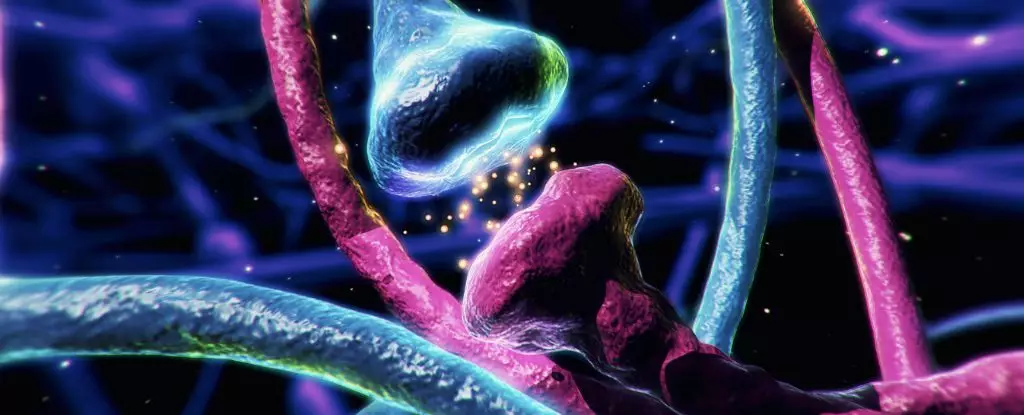For decades, the scientific community has held a somewhat simplistic view of dopamine’s role within the brain: a broad-spectrum messenger broadcasting signals across vast neural landscapes. This traditional perspective painted dopamine as a chemical megaphone, whose signals diffuse slowly, influencing large swaths of neurons indiscriminately. Such a model, while useful as a foundational understanding, inadvertently oversimplified the intricate and nuanced dance of neural communication. Recent breakthroughs, however, challenge this notion, revealing a more intricate and localized signaling mechanism that could transform our understanding of human behavior, mental health, and societal dynamics.
Emerging research illustrates that dopamine isn’t confined to the caricatured—slow, sweeping messages—it’s also capable of rapid, targeted whispers sent precisely within milliseconds to neighboring neurons. This localized signaling suggests an elegant, highly efficient system, capable of executing complex behaviors with remarkable specificity. It offers a new lens to perceive how the brain handles the barrage of decisions, rewards, desires, and fears that shape our daily lives. It’s not just a one-dimensional broadcast system; instead, dopamine functions as an intricate code, capable of fine-tuned modulation that influences our cognition and actions in ways previously unappreciated.
Implications for Mental Health and Humanity’s Self-Understanding
This refinement in our understanding bears profound implications—both scientific and societal. Conditions like addiction, schizophrenia, and Parkinson’s disease are currently understood through the lens of dopamine deficiency or dysregulation. But if dopamine operates on both broad and localized levels, then our therapeutic approaches might be woefully inadequate, addressing symptoms rather than root causes.
For society, this insight demands a paradigm shift in how we view human motivation and behavior. The long-held belief that dopamine is solely responsible for reward-driven actions—like drug cravings or reckless impulsivity—needs to be nuanced. Acute, localized dopamine signals suggest that our brain’s reward system is far more sophisticated, capable of micro-adjustments that make behaviors feel both spontaneous and intentional. This complexity feeds into debates about free will, moral responsibility, and the ways in which societal structures reinforce or exploit these neural mechanisms.
Moreover, understanding the dual modes of dopamine transmission forces us to confront the oversimplified narratives about mental health, addiction, and even morality. Societies that rely heavily on stigma and moral judgment for those suffering from neurological or psychological disorders might need to reconsider their standpoint—these conditions could stem from disruptions in micro-level signaling rather than blanket chemical deficiencies. This raises questions about personal responsibility and societal culpability, which too often are reduced to simplistic explanations.
The Power of Precision and the Threat of Control
From a political perspective, advancements in understanding dopamine’s localized signaling could be wielded in dual-edged ways. On the one hand, they open the door to highly targeted therapies that could revolutionize mental health treatment—customized interventions that restore precise neural communication, alleviating suffering without the broad side effects of current medications. This would be a victory for liberals who champion scientific progress and compassionate healthcare.
On the other hand, such knowledge could be exploited for manipulation. If governments or corporations learn how to influence dopamine release at the micro-level, they could influence individual choices with unprecedented precision, shaping desires and behaviors to fit wider societal agendas. The danger lies in a new form of control—an insidious manipulation of the human brain’s most delicate communication pathways—transforming autonomy into a fragile illusion under technological or social pressures.
As our understanding of dopamine deepens, societal debates about responsibility, authenticity, and freedom must intensify. Will future pharmacology and neurotechnology empower individuals or serve as tools of control? Who benefits—and who bears the burden—when our most fundamental motivational system becomes a battleground for influence and power?
Rethinking Neuroscience, Society, and Self-Identity
The discovery of dopamine’s dual modes of signaling compels a re-evaluation of how we see ourselves. If our motivations are rooted in a subtle interplay of broad and local signals, then human agency may be more fragile—and more malleable—than we previously believed. This has profound implications not just for medicine, but for our cultural narratives about responsibility, morality, and human nature.
In a societal context, embracing this complexity could foster a more compassionate and scientifically grounded approach to mental health. Recognizing that the brain’s communication system is both highly adaptable and vulnerable transforms stigma into understanding. It encourages policies that prioritize nuanced, personalized treatment over simplistic moral judgments.
Simultaneously, these insights demand vigilance. As neuroscience uncovers new layers of neural communication, the risk of misuse increases. Policymakers, scientists, and citizens alike must grapple not only with expanding knowledge but with the ethical obligations that come with wielding such power. The future of human society may well depend on how wisely we handle the complex, localized signals that drive our very minds.


Leave a Reply